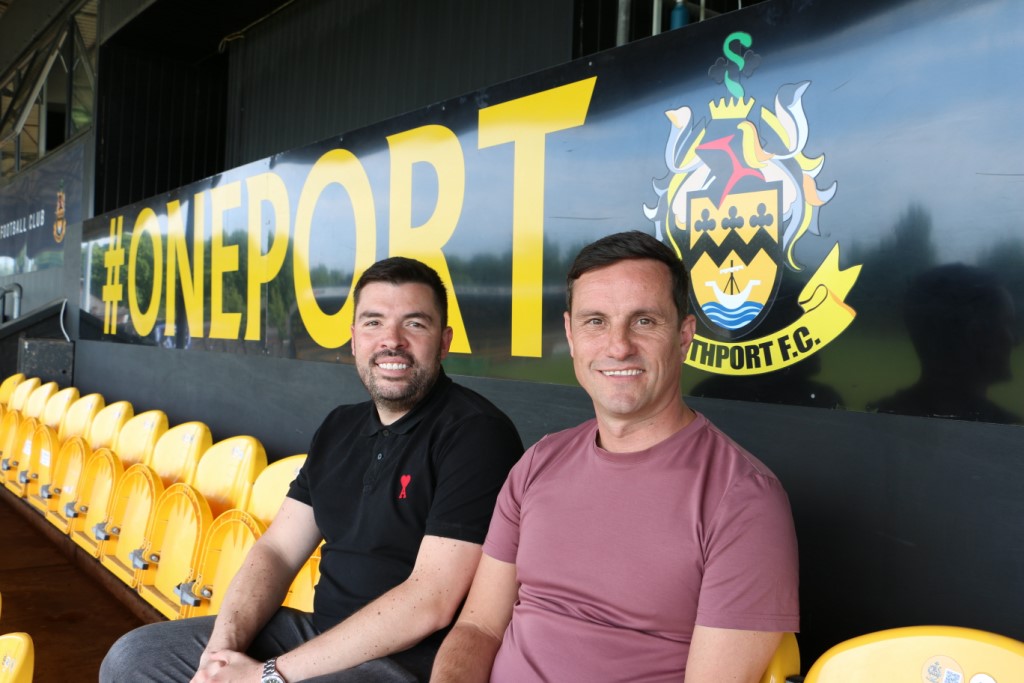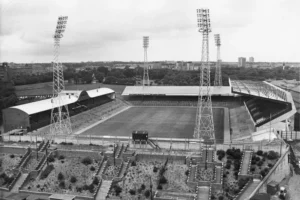There’s something about the 2nd of June. In 1888, the Southport Visiter reported a scheme to create the town’s first professional football club. In 1978, the club fell out of the Football League. In 2018, a director stepped away. And now, in 2025, a League meeting once again circled our future.
It never arrives quietly, this date. Whatever else changes, the 2nd of June always seems to have a say.
Which makes it all the more fitting that this was the week the latest chapter closed — not on the pitch, but in a boardroom, with Southport FC escaping something far more damaging than relegation.
Great escapes don’t always happen on the pitch.
Sometimes, they happen in the awkward silence after a “statement.” In the pause between a winding-up petition and a blocked order. Sometimes, the only celebration is a sigh — the kind you let out when you realise just how close the fire got to the fuse.
Southport FC just pulled off the most important escape in its history.
Not from relegation. From ownership.
Because for two years, we weren’t a football club. We were a civic experiment in borrowed branding — a side project pretending to be a sporting institution, run by people who looked like they’d wandered in off a seminar about social impact and forgotten where the door was.
The Big Help Group. Sounds lovely, doesn’t it? A name so warm it could hug you into submission. So wholesome you forget to ask who’s actually in charge — or why the club’s future seemed to depend on a charity with more sub-brands than sense. Maybe that was the point?
The only thing “Big” was the collapse. The only “Epic” part was the size of the mess. It’s always the same: give something a name like Big Help or Epic Holdings and you can almost guarantee the reality will be absolutely hopeless — like a bloke overcompensating with a five-litre Range Rover and stalling it at the lights.
At first, it was all smiles and community slogans. But the details were always fuzzy. Everything felt like it came from a brochure you couldn’t quite see. There were visions, apparently. They just never seemed to make it beyond laminated slides and buzzwords.
And then came the warning signs.
A bar contract that, in the eyes of many, ended in embarrassment. A kit supplier that apparently ghosted us like a bad date. A catering “strategy” that is better forgotten and plenty of broken promises.
And when the whole thing finally collapsed — and collapse it did — there wasn’t even a goodbye.
The group behind it all appeared to fall apart under the weight of its own ambition and hubris.
And just when you thought it couldn’t get more absurd — a familiar-looking “community initiative” popped up in a tax haven. Another launch. Another promise. Another destination that, one imagines, had more pressing concerns than needing a pop-up social enterprise in a shipping container. Because if there’s one thing war-torn countries cry out for, it’s vague optimism, PowerPoint slides, and a business plan scribbled on the back of a charity invoice.
If you handed this plot to The Thick of It, they’d send it back for being too far-fetched.
Meanwhile, back at the club, the real work fell to those left holding the mop, all wondering what the hell just happened — and how it was allowed to happen in the first place.
The answer? A distraction. A branding exercise. A shell game dressed up as civic virtue.
But the worst part?
People believed it.
The people who believed it weren’t fools. They were just fans — tired of waiting, hopeful something might stick, still turning up long after the promises had vanished.
We wanted to believe it. In something new. In someone who cared. We mistook presence for leadership, words for substance, logos for accountability. And the people responsible knew exactly how to sell it.
They almost got away with it.
But they didn’t.
Because the takeover is now complete. The Big Help Group is out.
This wasn’t just a lucky escape. It was the great escape.
We’ve walked out of the rubble and only now realised just how much of the structure was hollow. We dodged the real relegation — not down a division, but into irrelevance.
So no, there won’t be champagne. But there’s clarity. And a chance to rebuild — properly, this time.
So, now what?
The League’s decision to allow the change of ownership wasn’t a clean bill of health — even the club have confirmed that it is a provisional nod with conditions attached. This isn’t standard paperwork; it’s the clearest signal yet that what’s gone on over the last two years wasn’t just chaotic — it was dangerously close to the edge. The message is unmistakable: the club might have new names at the top, but it doesn’t yet have a blank slate. This wasn’t a rubber stamp — it was a raised eyebrow. A warning. What comes next has to be different. It has to be clearer, calmer, and far more careful.
Southport FC has a new ownership structure, a fresh set of names, and — for now — no offshore holding company in sight.
After years of grand plans, sudden exits – this isn’t the first time we’ve had a disappearing act, and governance that’s sometimes resembled a treasure hunt without the map, supporters could be forgiven for approaching this latest “new chapter” with something short of confetti cannons.
This time, it’s Keiran Malone and David Cunningham stepping in, with, if rumours are to be believed, long-time club figure Steven Porter finally taking the chairman’s seat after decades behind the scenes. On paper, it looks like a clean slate. And that’s no bad thing. The difference now? We’re all a little more experienced. A little more wary. A little more inclined to ask whether the foundations are made of brick or sponge cake.
We’re not asking for miracles. Just a pint before full-time, a scoreboard that isn’t running on Windows 95, a kit you can actually buy, and floodlights that last the full ninety. Ideally all at once, but we’ll take it in stages.
We don’t need a billionaire. We don’t need Premier League dreams. But we could do without ownership structures that involve six shell companies and a PO box in Luxembourg. We’d like to go a whole season without reading about bankrupt directors, administration, liquidation or dissolved charities. Just once.
What supporters want, more than anything, is honesty. No more castles in the sky. No more stadiums built on hope and hot air. Just tell us what’s possible. What’s not. And let us come along for the ride without having to Google who owns the club every other Tuesday.
The new board has the chance to set a different tone. Quiet competence would do nicely. Fewer slogans, more screwdrivers. After all, it’s not the noise that keeps a football club upright — it’s the stuff that gets fixed when nobody’s watching.
And for the new majority shareholders? The bar is low. If they can avoid launching Southport FC Gibraltar or unveiling another catering operation that requires a tent and a sleeping bag, they’ll already be ahead of the last lot.
So yes — let’s call it a fresh start. But let’s not pretend the slate is clean. The warning from the League is still warm on the page, and what happens next needs to be slower, steadier, and far more transparent than what came before. We’re not being handed a second chance — we’re being told to prove we deserve one.
If this really was a great escape, it’s one where the tunnel’s behind us but the barbed wire is still rattling. There’s no clean break — just a chance to stop digging. And for those now in charge, the job isn’t to inspire belief. It’s to earn trust and those fans who’ve stayed loyal through years of turbulence deserve to know it won’t happen again.
It’s not cynicism. It’s experience. And experience packs a flask, just in case.
Disclaimer: This article is a work of commentary. All references to companies, events, and civic chaos are intended for humorous reflection and social observation. Any resemblance to actual disasters, dissolved partnerships, or vanishing social impact initiatives is purely coincidental — though, let’s be honest, some of it’s just non-league football.
Discover more from Southport Central
Subscribe to get the latest posts sent to your email.

 1 - 3 v FC Halifax Town (H) 11/10/2025
1 - 3 v FC Halifax Town (H) 11/10/2025 







Thanks for the update. Here’s hoping…… Joe